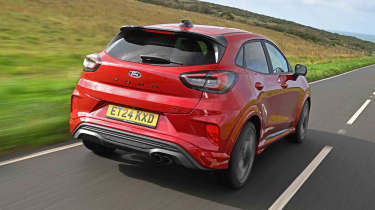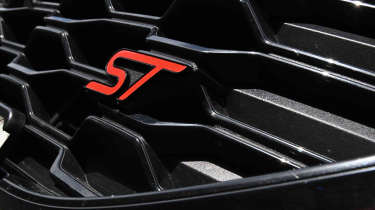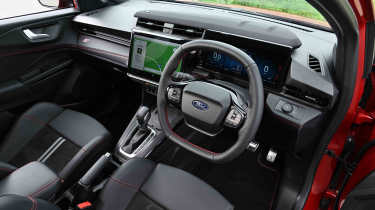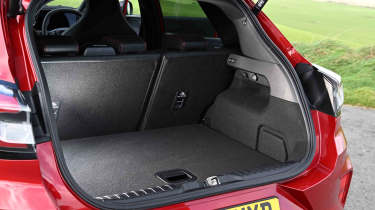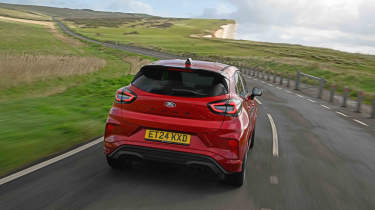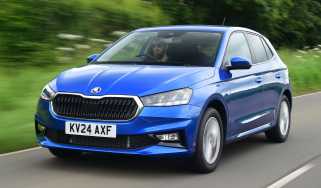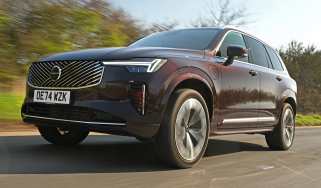Ford Puma ST review – not as fun as it used to be
"The Ford Puma ST offers great handling, but its lacklustre automatic gearbox and engine have removed all the fun”
Pros
- Great handling
- Precise steering
- Practical
Cons
- Sluggish automatic gearbox
- Needs more power
- Regular Puma just as good to drive
Verdict – is the Ford Puma ST a good car?
Don’t be fooled – since the Ford Puma’s facelift, the ST is no longer the same fun-filled hot SUV it was before. Gone is the 1.5-litre EcoBoost and slick six-speed manual gearbox, but most importantly, gone too is the charm and driver involvement they provided. It’s replaced by the 1.0-litre engine with an automatic that feels no more fun than a standard Puma, and all versions of the Puma boast good handling, so you might be better off sticking with a standard one.
Ford Puma ST models, specs and alternatives
Fast Fords have long been a staple of the Blue Oval’s lineup, helping to give a healthy dose of desirability and street cred to its models. With the Fiesta and its performance-focused Fiesta ST version both discontinued and the Focus and Focus ST also on their way out, it has fallen on the Puma ST to fly the flag for performance.
We loved the pre-facelift Ford Puma ST – it was punchy, agile, but most of all it was engaging. It used the 1.5-litre version of the turbocharged EcoBoost engine found in the Fiesta ST and a six-speed manual that really made the difference when compared with the standard Puma, but Ford has replaced this with a 168bhp 1.0-litre mild-hybrid engine with an automatic transmission, and that’s really where things have taken a turn for the worse.
This version existed in pre-facelifted cars badged ‘ST Powershift’, that was positioned as a more economical SUV compared to the full-fat manual 197bhp ST, but has now taken the reins completely. It’s 0.7 seconds slower from 0-62mph than the old Puma ST, though some of the appeal lies in the fact it’s also easier to drive in traffic and returns up to 44.8mpg. The thing is, efficiency isn’t necessarily the main thing you want if you’re looking for a performance car, and the old ST wasn’t particularly expensive to run.
More reviews
The standard Puma uses a variation of that same 1.0-litre engine, and it’s not even that much less powerful. The standout feature spanning the entire Puma range is already its great handling, meaning the Puma ST just makes much less sense than it used to. An ST-Line car gets a sporty look that’s not far off the full ST, and yet costs a significant amount less, which only serves to further damage the ST’s case.
Alternatives to the Puma ST now include the Volkswagen T-Roc R or Audi SQ2, or for a slightly larger hot SUV you might look towards the Cupra Formentor. The Puma ST used to be much more fun than these cars despite their impressive on-paper figures, but that’s no longer the case since the ST’s facelift.
MPG, running costs & CO2 emissions
The Puma ST has always been pretty economical for a performance car, even when it had the larger 1.5-litre three-cylinder engine. Now that Ford has discontinued this in favour of the 1.0-litre mild-hybrid, it’s even more economical.
Official economy figures are up to 47.9mpg with CO2 emissions of 135g/km, compared to 41.5mpg and 151g/km from the old 1.5-litre manual. Ford says the automatic transmission helps to keep the engine in the optimal rev range when cruising along and works with the mild-hybrid system to prioritise fuel economy.
Unfortunately, despite the new, smaller 1.0-litre engine having a lower power figure, it only sits one group lower in the insurance group ratings out of 50 – while the old 1.5-litre was in group 22, the latest version is in group 21.
The elephant in the room here is the fact that the standard Puma models have the potential to be even more fuel-efficient and cheaper to insure, and there isn’t a major increase in performance with the ST.
Engines, drive & performance
The main reason you’d opt for the Puma ST over a regular one would be for the way it drives and the extra performance on offer. We thought the pre-facelift model was one the most fun SUVs you could have, but things have majorly changed since the update.
While you had a choice between the top-of-the-range 1.5-litre EcoBoost engine with a six-speed manual transmission and the ST Powershift using a 1.0-litre engine and seven-speed auto before, the larger of the two has been discontinued. That means the most potent version of the Puma you can now buy has 168bhp, compared with the 197bhp of before.
Power, of course, isn’t necessarily the be all and end all – the Puma ST offers superb handling and driving feel. It’s incredibly composed and agile thanks to its excellent suspension setup with precise, responsive steering and great levels of grip.
If anything, though, that brilliant handling only serves to further highlight the Puma ST’s flaws. With a 0-62mph time of 7.4 seconds, it’s now 0.7 seconds slower than before, and we found the seven-speed dual-clutch automatic gearbox very slow to respond, even in manual mode with the paddle shifters. As a result, the Puma ST feels as though it could cope with much more and is no longer being pushed to its limits – indeed, we know that for a fact.
The automatic gearbox is even unimpressive at lower speeds – we found it to be hesitant not only when you put your foot down, but also while exiting junctions in in-town driving, which isn’t confidence-inspiring when you need to squeeze into a gap in traffic.
The ride quality is set up for performance, which means the tradeoff is a slightly fidgety ride. Once you're up to speed on the motorway, however, the Puma ST is more comfortable.
Interior & comfort
As part of the Puma’s update, the interior was made much more minimalist, while the infotainment was updated and now the screen is larger. We lament the loss of many of the physical buttons from before, however.
On the Puma ST you get heated sports seats with six-way manual adjustment – these were previously provided by Recaro before the facelift but now get Ford Performance branding. The steering wheel is also heated as standard.
Ford’s latest SYNC system is displayed on a 12-inch touchscreen and now features such as the climate control are tweaked via this screen. That’s a shame, though because it might make adjusting them on the fly a bit more difficult than it would be to reach and turn a physical knob without taking your eyes off the road.
We like the premium Bang & Olufsen sound system on the ST – it’s high-quality and produces a good sound that’s worthy of a top-spec model.
Boot space, practicality & dimensions
All of the regular Puma’s neat practical touches are still present in the ST model, which is great to see. The fantastic ‘Mega Box’ is present in the boot – this is a huge 80-litre storage compartment under the floor that’s big enough for a whole family shop.
The boot itself is excellent at 456 litres, and the plastic floor means you can even hose it out – there’s a plug at the bottom of the Mega Box that lets water drain away.
Inside the Puma you’ll find a good amount of passenger space, though adults in the back might start to feel cramped on a longer trip.
Reliability & safety
Ford has been on a downward spiral in recent years in terms of customer satisfaction. In 2024 it came in a disappointing 30th place out of 32 brands in our Driver Power survey. Buyers just aren’t happy with build quality, the brand’s interiors or even, surprisingly, the ride and handling of its cars, while practicality was also a disappointment.
The Ford Puma itself was rated the 10th best car out of the 50 models that appeared in our 2024 Driver Power survey, and buyers were fans of its infotainment and engines most of all – these won’t necessarily be representative of the performance-focused ST, however, and we can only hope the updates to the brand’s infotainment will also be considered an improvement as these respondents will have been rating the older system.
Reliability itself doesn’t seem to be a major issue despite some issues and recalls with much older EcoBoost engines in the past decade, and 20.8% of Ford owners reported an issue with their car in the first year – most of these will have been Ford Puma owners, too, as it’s the brand’s best seller.
The standard Ford Puma’s safety ratings also apply to the Puma ST. In 2019 the Puma received an impressive five-star rating from Euro NCAP, but it was reassessed in 2022 when it lost a star due to subpar adult occupant safety scores.
